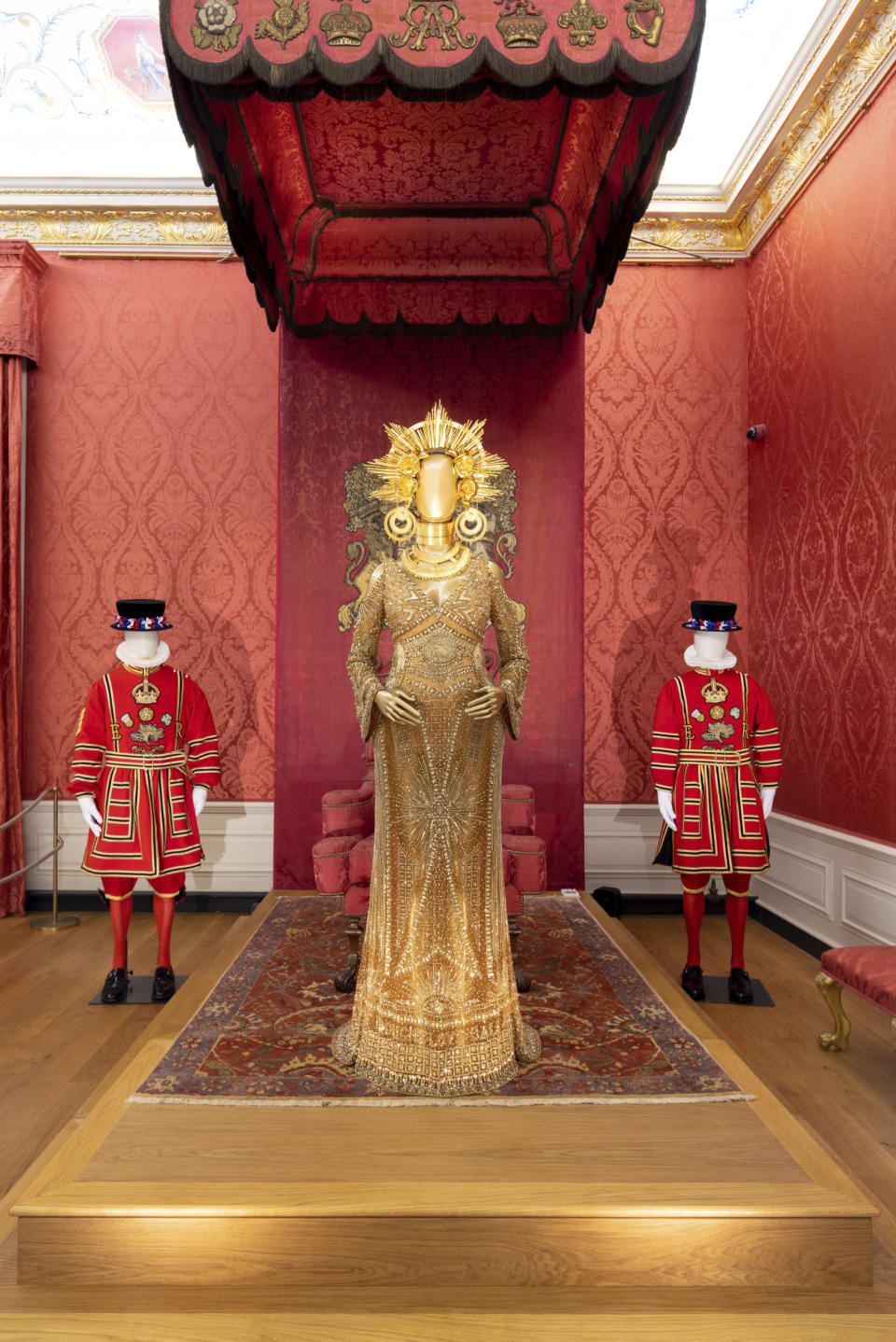Social Climbing With the Georgian Style Set

LONDON — It was the age when looks were everything, when towering, bejeweled hair, wide skirts and diamonds as big as robin’s eggs opened the gates to Kensington Palace, to an audience with the kings, queens and princes of Georgian England.
Men, with their shoe buckles glittering and silk stockings padded to create the illusion of muscular calves, were just as status-conscious as the ladies. They dressed like peacocks, hoping to strut past the king’s guards to consort with royals, politicians and fellow power brokers at the palace.
More from WWD
A new show at Kensington Palace, “Crown to Couture,” looks at the showy, status-obsessed Georgians and how they used fashionable dress and elaborate hair, makeup and jewelry to gain access to the British royal court of the 18th and early 19th centuries, under kings George I, II, II and IV.
It also looks at how their legacy is thriving on the red carpet today.
The show, which runs from Wednesday until Oct. 29 at the Kensington Palace State Apartments, showcases more than 200 period and contemporary costumes and decorative objects. They range from the widest surviving court gown in Britain, which measures nearly 10 feet, to the Moschino light-up chandelier dress that Katy Perry wore to the 2019 Met Gala.
There are historical gowns shimmering with silver threads meant to sparkle in the candlelight, and outshining them is the golden dress, by Peter Dundas, that Beyoncé wore for the 2017 Grammy Awards. The latter is on display in the room where monarchs would once have received courtiers, ministers and foreign ambassadors.
The show’s sponsors are the Blavatnik Family Foundation, Cunard and Garrard, so there is a hoard of jewelry on display to match the extreme fashion.

In the jewelry room, there is the vintage gold and diamond feather headdress tiara made by Verdura in 1957 for Betsey Cushing Whitney, wife of a U.S. ambassador to the Court of St. James’s, and the fife tiara, dripping with fat diamonds, that once belonged to Princess Louise, a granddaughter of Queen Victoria.
“The stakes were very, very high for these court appearances,” said Polly Putnam, curator at Historic Royal Palaces, the charity that looks after the public spaces at Kensington Palace, the Tower of London and Hampton Court Palace, among other historic buildings.
Putnam said that potential guests could also borrow or hire outfits and wear paste, instead of real jewelry.
In the end, it would be up to the Yeomen of the Guard, the Georgian-era royal bouncers, to make the final call. If potential visitors to court looked rich or well-groomed, the yeomen would wave them through. If not, it was time to return home, and re-think the outfit.
The yeomen weren’t the only ones scrutinizing the socialites and the social climbers.
The Georgian era also saw the birth of the modern fashion press, with publications such as The Derby Mercury critiquing the looks outside Kensington Palace, describing some as “quite plain,” one of the greatest insults in the fashion journalist’s arsenal.
In the show, Putnam also draws parallels between the role of the stylist, then and now.
The celebrity stylist of Georgian times was Frances Abington, a famous London actress from the mid-18th century who introduced new fashions while on stage, and who was paid to advise important women. The show features two portraits of Abington by Sir Joshua Reynolds and Johann Zoffany.
In the show, Putnam highlights the work of contemporary stylists including Rose Forde, Elizabeth Saltzman and Sam Ratelle, the latter of whom worked with Billy Porter on his look for the 2019 Met Gala. Porter’s Sun God outfit for the occasion was designed by the New York-based label The Blonds.
The show also looks at fancy clothing as political statement.
On display are dresses with environmental slogans from Vivienne Westwood’s 2008 spring show; a glittery clutch from Judith Leiber that spells “Freedom” that was specially made for the exhibition, and a black dress emblazoned with the word “Vote.”
Designed by Christian Siriano, the dress was worn by Lizzo during the U.S. presidential election in 2020.

Those looks are meant to echo the political statements that some wealthy Georgians were keen to make. Depending on their leanings, some Georgians would wear hair ribbons that read “God Save the King,” or stencil fabrics with candle smoke to create political slogans.
The Georgian era was also the time when Britain consolidated its empire and ramped up trade with the rest of the world, and there are many foreign influences on display.
They include a delicately embroidered Jamdani muslin dress from India, a paisley block print dress and a spectacular, embellished cream coat worn by Tan France, the British-American designer and TV personality.
The moral of the exhibition? Nearly 200 years after the last King George died, style still matters.

Best of WWD
Solve the daily Crossword

